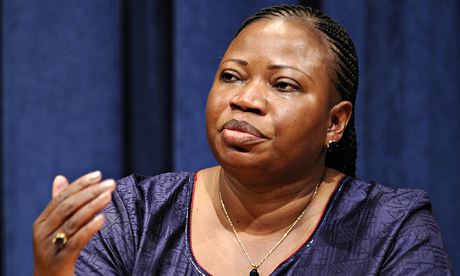War crimes inquiry hinges on ICC's confidence in UK investigations
Move cannot lead to prosecutions if court believes UK authorities are conducting genuine investigations

ICC prosecutor Fatou Bensouda has been invited to visit the UK and assess the work being done by the Iraq historic allegations team. Photograph: Emmanuel Dunand/AFP/Getty Images
The re-opened preliminary examination of allegations that British troops abused Iraqi detainees between 2003 and 2008 is the last thing the government must have wanted. In January, when Phil Shiner's firm Public Interest Lawyers and a Berlin-based litigation pressure group known as ECCHR sent a 250-page complaint to Fatou Bensouda, prosecutor of the international criminal court (ICC), William Hague argued that there was no need for the ICC to get involved. The foreign secretary pointed out that allegations of mistreatment were already being investigated by IHAT, the Iraq historic allegations team established by the British government.
The attorney general, Dominic Grieve, has again rejected the allegation that there was systematic abuse by British forces in Iraq. He added: "The UK government has been, and remains a strong supporter of the ICC and I will provide the office of the prosecutor with whatever is necessary to demonstrate that British justice is following its proper course."
But although Bensouda has now agreed to the re-open the preliminary examination under article 15(2) of the ICC's Rome statute, she has not asked the court to order the formal investigation under article 15(3) that Shiner and ECCHR had also requested. And without a full investigation, a complaint such as this cannot lead to a prosecution before the ICC. Bensouda said that no decision on the opening of an investigation would be taken until a thorough analysis of all the relevant information had been completed by her office.
IHAT is currently investigating 52 allegations of "unlawful death" (involving 63 alleged victims) and 93 allegations of mistreatment (involving 179 alleged victims). If there is sufficient evidence, individual members of the armed forces could be tried before courts martial in the UK. IHAT has confirmed that it is investigating all but one of the cases identified in Shiner's complaint.
It will be up to the director of service prosecutions, Andrew Cayley QC, to assess the evidence obtained by IHAT and decide whether charges are in the public interest. With the attorney general's consent, he could charge individuals with committing war crimes, all of which are offences under English law.
War crimes include wilful killing, torture, and "outrages on personal dignity, in particular humiliating and degrading treatment". The maximum penalty is 30 years; or life imprisonment in a case involving murder.
If a case is being investigated or prosecuted by a state that has jurisdiction over it, it becomes inadmissible under article 17 of the Rome statute and cannot be the subject of a full investigation by the ICC. The principle of complementarity is fundamental to the court: it tries defendants only when states are unwilling or unable to do so.
Bensouda has been invited to visit the UK and assess the work being done by IHAT, a process Cayley described as "positive complementarity". He told reporters he was confident the prosecutor would be satisfied that IHAT was conducting genuine investigations and that prosecutions would be brought before courts martial where appropriate.
For that reason, Cayley was confident that the prosecutor would not seek to begin a formal investigation. If he is right, British troops will not face trial at The Hague as the result of Shiner's intervention.
In their written submission, Shiner and ECCHR argued that the UK had so far failed to meet the standards of investigation and prosecution needed to make the case inadmissible. In their view, a formal investigation should be initiated by the court. That argument has not been accepted by the prosecutor – yet. But, as a result of Shiner's intervention, IHAT and Cayley will have to make sure that their work meets the standards that will be set by Bensouda and her team. That must count as something of a success for Shiner and ECCHR.
The prosecutor's office first considered these allegations eight years ago. In 2006, Bensouda's predecessor said there was a reasonable basis to believe that crimes of wilful killing and inhuman treatment had been committed. However, on the limited evidence then available, Luis Moreno-Ocampo said the alleged crimes were not of sufficient gravity to justify seeking a formal investigation. Explaining her decision to reopen the case, Bensouda said the new complaint "alleges a higher number of cases of ill-treatment of detainees and provides further details on the factual circumstances and the geographical and temporal scope of the alleged crimes".
Shiner alleged that "those who bear the greatest responsibility for the crimes are situated at the highest levels, including all the way up the chain of command of the UK army, and implicating former secretaries of state for defence and ministers".
However, he accepted in a letter to the Guardian in February that Tony Blair could not face charges at the ICC because the court does not yet have jurisdiction over the crime of aggression.
Cayley and the IHAT head, Mark Warwick, have promised to go where the evidence takes them. But they made it clear to reporters that, as the evidence now stood, no civilians were likely to face prosecution.

No comments:
Post a Comment